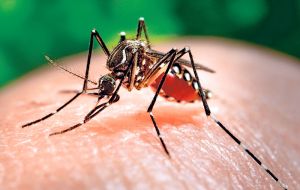MercoPress. South Atlantic News Agency
Fourteen countries in a US travel alert for pregnant women because of Zika virus
 With the virus linked to birth defects, CDC has advised pregnant women that should consider postponing travel to areas where Zika virus transmission is ongoing
With the virus linked to birth defects, CDC has advised pregnant women that should consider postponing travel to areas where Zika virus transmission is ongoing  Mosquito transmitted Zika causes a dengue-like illness, with symptoms that include fever, headache, skin rash, red eyes, and muscle ache
Mosquito transmitted Zika causes a dengue-like illness, with symptoms that include fever, headache, skin rash, red eyes, and muscle ache The Centers for Disease Control and Prevention (CDC) has issued travel alert for people traveling to the Caribbean and other areas that have confirmed transmission of the mosquito-borne Zika virus.
With the virus linked to birth defects, the CDC has advised pregnant women that out of an abundance of caution, they should consider postponing travel to the areas where Zika virus transmission is ongoing: Brazil, Colombia, El Salvador, French Guiana, Guatemala, Haiti, Honduras, Martinique, Mexico, Panama, Paraguay, Suriname, Venezuela, and Puerto Rico.
The Level 2 alert, which indicates that travelers are advised to practice enhanced precautions – follows reports in Brazil of microcephaly – a rare condition in which the brains of infants are unusually small – and other poor pregnancy outcomes in babies of mothers who were infected with Zika virus while pregnant.
According to Brazilian health authorities, more than 3,500 microcephaly cases were reported in Brazil between October 2015 and January 2016. Some of the affected infants have had a severe type of microcephaly and some have died.
The CDC stressed that additional studies are needed to further characterize the relationship and more studies are planned to learn more about the risks of Zika virus infection during pregnancy, but “until more is known, and out of an abundance of caution, CDC recommends special precautions for pregnant women and women trying to become pregnant”.
“Pregnant women in any trimester should consider postponing travel to the areas where Zika virus transmission is ongoing. Pregnant women who must travel to one of these areas should talk to their doctor or other healthcare provider first and strictly follow steps to avoid mosquito bites during the trip,” it said.
“Women trying to become pregnant who are thinking about becoming pregnant should consult with their healthcare provider before traveling to these areas and strictly follow steps to prevent mosquito bites during the trip.”
The advice from the CDC to travelers is that they wear long-sleeved shirts and long pants; use insect repellants; use permethrin-treated clothing and gear (such as boots, pants, socks, and tents); and stay and sleep in screened-in or air-conditioned rooms.
Zika causes a dengue-like illness, with symptoms that include fever, headache, skin rash, red eyes, and muscle ache, and it is usually mild and does not require hospitalization. Four in five people who acquire Zika infection may have no symptoms.
There is currently no vaccine to prevent or medicine to treat Zika.
Locally acquired Zika was reported for the first time in Brazil in May 2015, and the virus has since been reported in 14 countries and territories in Latin America and the Caribbean. A first case of the virus has been reported in United States.
A baby born with brain damage at a hospital in Oahu, Hawaii, has been confirmed to have been infected by the Zika virus, that state’s department of health said, in what appears to be the first US case of the mosquito-borne virus.
The Hawaii State Department of Health said in a written statement that the mother was believed to have had a Zika infection while living in Brazil in May 2015 and that the baby was likely infected in the womb.
“We are saddened by the events that have affected this mother and her newborn,” Dr. Sarah Park, Hawaii state epidemiologist, said.




Top Comments
Disclaimer & comment rules-

Read all commentsI am shortly travelling to two of the countries mentioned on this list and have been emphatically warned by friends there to travel “well armed” with the most effective insect repellents.
Jan 20th, 2016 - 08:28 am 0The London School of Tropical Medicine is a good source of information.
Commenting for this story is now closed.
If you have a Facebook account, become a fan and comment on our Facebook Page!